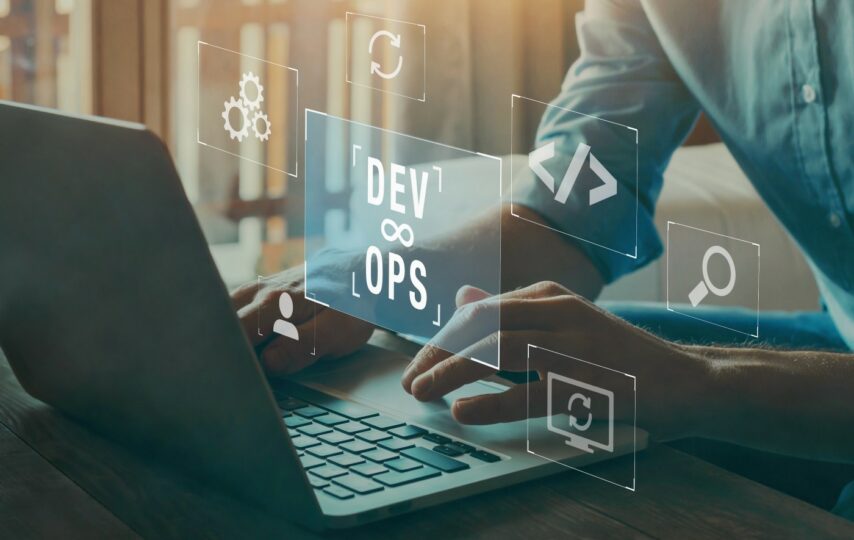DevOps is not only a culture, but an essential practice to enhance collaboration and implement agile methodologies. Integration of DevOps practices enables organizations to streamline their software development process with better flexibility.
Consider DevOps as the main switchboard connecting other crucial development processes. Starting from writing to code to utilizing efficient tools to enhance cooperation among testers, developers, and operations teams.
For instance, picture that you are working on the development of a web application. By employing DevOps practices, whenever you change or write a new code, the automated process does necessary testing instantly. In this way, you identify those issues which can later become huge.
Being a CTO, there are so many challenges you have to face. But, this blog will help you to overcome those issues by employing best practices in the DevOps landscape.
Key Trends in DevOps Landscape Expected to Boom in the Upcoming Years
The DevOps landscape is continuously evolving. Different key trends and QA professionals expect the following trends to emerge as strong factors to include Devops in the software development process.
Containerization and Kubernetes
Containerization is a key DevOps practice to bundle up the application and all its features like configurations and libraries into a single package. In short, it contains everything which developers need to run an application. The benefits of containerization are-
- Better consistency as it removes compatibility issues to run the application on any device or platform.
- They share the host OS kernel which leads to quicker deployment.
- You can version and store the container images in the container registries for easy traceability.
- On the other hand, Kubernetes seamlessly aligns with the DevOps principles. Its essential feature is to automate complex tasks such as load handling, scaling, and rolling updates.
The declarative approach of Kubernetes allows you to specify the application state accordingly and then match them with the actual state.
- It helps in managing the resources efficiently and ensures access to the CPU in the right amount.
- It also allows version control, automated deployment, and collaboration which are the main pillars of DevOps practices.
Machine Learning and AI Integration
Artificial Intelligence and Machine Learning are also expected to make a significant impact in DevOps practices. Utilizing advanced insights and algorithms improves the data-making process and optimizes the development pipeline.
Machine Learning algorithms can be leveraged to analyze large amounts of data to identify abnormal behavior.
AI-driven tools trigger appropriate responses and analyze the impact for incident management automatically.
Its proactive approach allows your team to address significant concerns to ensure a stable and effective user experience.
AI in DevOps practices also helps the team to measure historical data and make necessary improvements through instant communication.
Hybrid and Multi-Cloud Environment
The hybrid cloud environment is the combination of on-premise infrastructure and private/public cloud services. It opens several new opportunities for your company as you can take advantage of a wide range of benefits of both the environment.
However, working in a multi-cloud environment requires utilizing services from multiple cloud services. This unique infrastructure mitigates the major risk of relying on one provider and utilizing specialized services.
Let’s look at the benefits of hybrid and multi-cloud environments that will suit best for your back-end and front-end frameworks for web development.
- The multi-cloud setup enables your organization to deploy your resources in various regions which enhances user experience at a global level.
- You get the liberty of selecting the best and most cost-effective provider for every work and reduce unnecessary expenses.
- The hybrid setup ensures robust recovery of critical data enhancing continuity.
- Ensure compliance and security by keeping non-sensitive workloads on the cloud and sensitive data on-premise.
Collaboration with Remote DevOps
The demand for remote work opportunities is increasing rapidly. Thus, the DevOps landscape also supports this modern work culture with efficient tools, practices, and tools for seamless collaboration across the world.
Various virtual communication platforms support real-time conversations, brainstorming sessions, and meetings, among DevOps teams. Also, the online knowledge-sharing and documentation platforms empower DevOps teams to collaborate on every aspect.
- Code changes are effectively merged, tracked, and received for seamless collaboration.
- Real-time knowledge transfer among team members will foster team skill development and enhance the overall quality of software.
- DevOps teams can easily diagnose and resolve issues together which minimizes downtime.
No-Code or Low-Code DevOps
The trend of no-code and low-code platforms in the DevOps landscape is also booming. DevOps teams can integrate No-code and Low-code applications for automated testing, CI/CD pipeline, and monitoring.
The low-code platforms provide a stable middle ground for no-code solutions and traditional coding. Their pre-built templates and components enable smooth customization for developers and reduce the need for manual coding.
However, developers can use no-code platforms by dragging and dropping the essential components. It allows users to define a workflow with a visual interface. Thus, you must have a basic knowledge of coding to utilize it for various purposes.
- DevOps professionals validate No-Code and Low-Code applications to focus on data flow, integration points, and overall functionality.
- The low-code platforms act as a bridge between the developers and users to meet user needs.
- Utilizing low-code tools will enable your team to quickly respond to changing requirements and integrate new features easily.
Conclusion
In conclusion, the above trends and strategies represent a major evolution in the DevOps landscape. CTOs must remain informed about every new trend and understand their impact on the software development process.
Hence, analyzing the above practices will help you find the best DevOps Service for software development. It’s high time you explore and learn about the DevOps landscape and begin working on it now!








